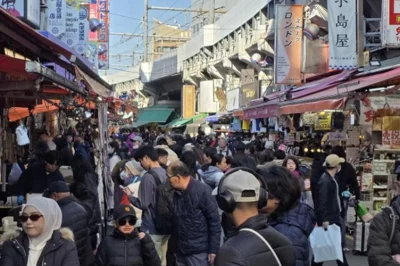South Koreans top Japan visitors as China plunges

Foreign tourists crowd a market street in Tokyo’s Ueno district. Photo by Asia Today
Feb. 20 (Asia Today) — South Korea was the largest source of foreign visitors to Japan in January, filling a gap left by a sharp drop in Chinese tourism, according to official data released this week.
The Japan National Tourism Organization said 3,597,500 foreign travelers visited Japan in January, down 4.9% from a year earlier and marking the first year-over-year decline in four years following the COVID-19 pandemic.
South Korea accounted for 1,176,000 visitors, up 21.6% from a year earlier and representing 32.7% of all arrivals. It was the highest monthly total on record for a single country or region in January.
In contrast, Chinese visitors fell 60.7% to 385,300 from 980,250 a year earlier. The decline followed calls by the Chinese government urging restraint in travel to Japan. The drop extended a steep fall in December.
Visitors from Hong Kong also declined 17.9% to about 200,000, reducing the combined share of mainland China and Hong Kong to roughly 11% of total arrivals, compared with 20% to 30% in previous periods.
Other markets showed solid growth. Taiwan sent 694,500 visitors, up 17%, while the United States recorded 207,800 arrivals, up 13.8%. Australia contributed 160,700 visitors, up 14.6%. South Korea, Taiwan and Australia each posted record January figures.
Despite the slump in Chinese travel, 17 countries and regions set record January totals, helping to limit the overall decline. The tourism agency cited demand for winter sports and an increase in long-stay travelers as supporting factors.
Industry officials said group tours from China have been more heavily affected than individual travelers. The downturn followed remarks by Prime Minister Sanae Takaichi related to Taiwan, after which Beijing encouraged citizens to reconsider trips to Japan.
Tourism operators are seeking to reduce reliance on Chinese demand. A sake brewery in Niigata said Chinese visitors account for about 10% of its 7,000 annual foreign guests. On a recent tour, no Chinese participants were present.
Tourism Agency Commissioner Shigeki Murata said bookings from non-Chinese markets are maintaining levels seen during last year’s Lunar New Year holiday. Yusuke Miura, an economist at Nissei Research Institute, warned that prolonged travel restraint from China could pose risks and called for both businesses and the government to diversify by market.
China’s Spring Festival, which began Feb. 15, typically overlaps with Japan’s off-season for domestic travel, making Chinese tourists a key source of winter demand. Analysts are watching closely how the shortfall will affect hotels, restaurants and souvenir shops.
— Reported by Asia Today; translated by UPI
© Asia Today. Unauthorized reproduction or redistribution prohibited.
Original Korean report: https://www.asiatoday.co.kr/kn/view.php?key=20260220010006001
